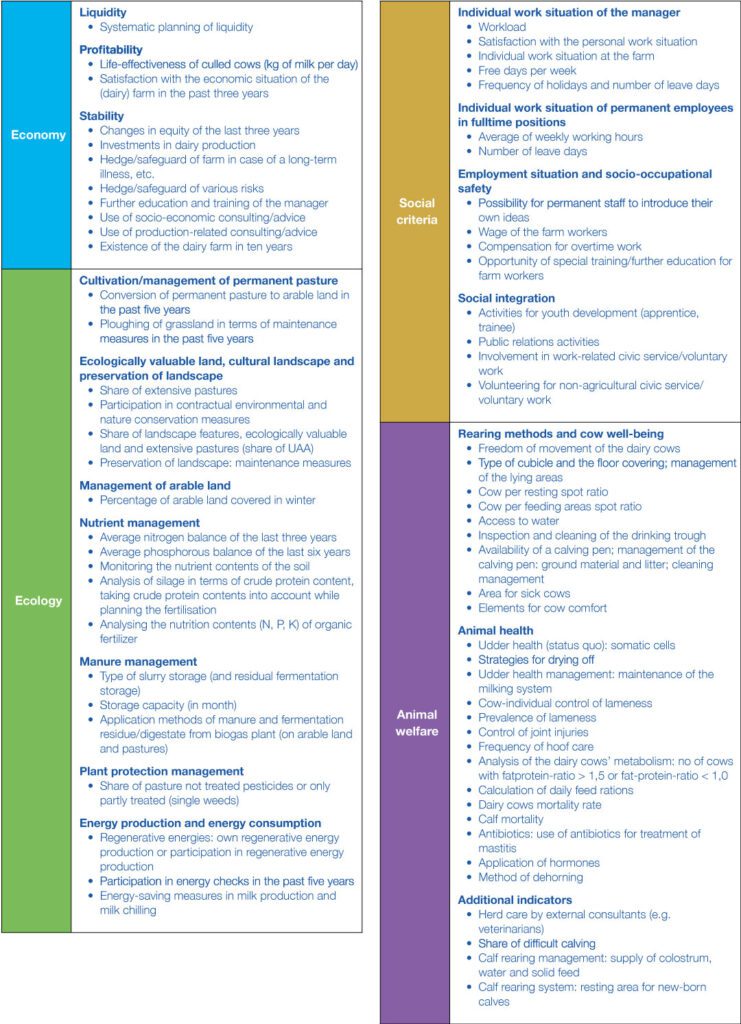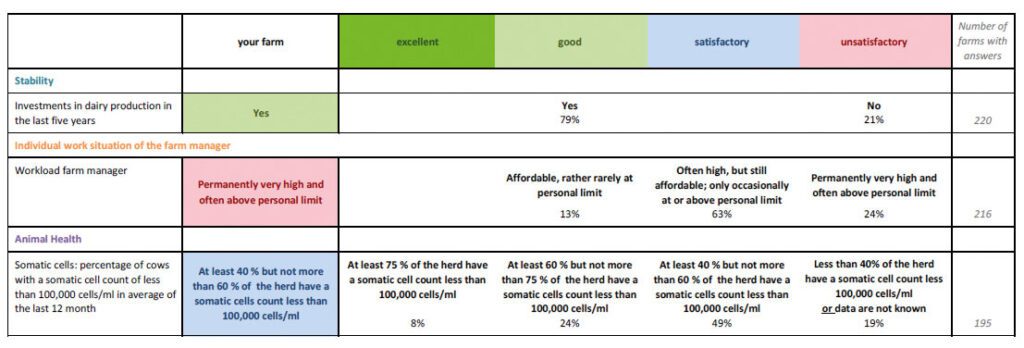Share this page
Alignment with SDGs
AUTHOR
Tomke Lindena, Anna-Sophie Claus, Heike Kuhnert, Birthe Lassen and Hiltrud Nieberg Johann Heinrich von Thünen Institute
Abstract
Sustainability is gaining more and more importance in the production, processing and marketing of food at national and international level. This also applies to the German dairy industry. In the past, sustainability initiatives were mainly focused at the level of dairy processors. Fields of action include energy-saving measures, steps to reduce water consumption, optimisation of routes for milk collection and reductions in packaging materials. Nowadays, the focus is increasingly shifting towards the whole value-added chain. Consumers, society, food retailers and food companies, internationally and national, want to know how sustainable milk production at farm level in the German dairy industry is. Yet, the inclusion of dairy farms within the dairy-processor specific sustainability concept poses particular challenges.
On the one hand, there is a large number of dairy farms and with very different production conditions. In Germany, agriculture takes place under the open sky, so external effects have to be considered. On the other hand, it implied the recording at dairy farm level of a very broad range of sustainability aspects covering economic, ecological and social issues as well as animal welfare. Yet, so far there are scarcely any simple workable and cost-effective means to measure sustainability at dairy farm level in its entirety.
Development of a monitoring tool for measuring and validating the sustainability of dairy farms
A basic-tool for monitoring the sustainable development of dairy production in Germany was developed. The aim was to measure and assesses a broad range of sustainability criteria in a large number of farms, in order to:
- be able to provide information to business partners or to the society regarding strengths and weaknesses of dairy farms concerning sustainability criteria
- and on basis of all the information gained, to support the sustainable development of dairy farming.
The so-called “Dairy Sustainability Tool” builds upon three previous studies (Flint et al., 2016, Lassen et al., 2014, 2015). Applying a transdisciplinary approach these studies discussed and agreed sustainability criteria (Table 1) and their respective assessments/ratings (Table 2) with different stakeholders from the dairy business in several workshops. Stakeholders were managers of dairy farms, representatives of dairies, agricultural associations and environmental and animal welfare NGOs, agricultural extension services, food retailers, food industry and several scientists.
The following requirements were applied when selecting the criteria, including their assessment: they needed to be scientifically defined and validated and at the same time to be measured and collected at a reasonable cost and time period by the farmers, using a written questionnaire. To make the tool cost-effective and applicable to many dairy farms, mainly indirect/driving-force indicators were used. Sustainability criteria and their respective ratings were identified based on: scientific literature reviews, international frameworks (e.g. SAI, DSF), results from existing assessments of sustainability criteria in other measurement systems and on existing legislative frameworks with respect to the criteria.
As a result, the tool consists of (a) a questionnaire for measuring more than 60 sustainability criteria, (b) factsheets with explanations (background and status-quo) of every sustainability criteria and their respective ratings and (c) a web-based questionnaire as well as (d) a database.
How is the tool used?
The dairy processors interview their milk producers with the questionnaire of the “Dairy Sustainability Tool”. Usually, milk producers themselves enter the data into the central database using the web-based questionnaire. Data are then checked for plausibility and analysed by the Thünen Institute. Each dairy processor receives a comprehensive report of the results. Additionally, results are presented internally to the dairy processor. Together, the facts about the status quo are examined and discussed. Strengths and weaknesses of dairy farms regarding the broad range of sustainability criteria are identified, as well as potential for improvements (also by using farm individual benchmarks; see Tab. 2). On basis of all the information gained, goals for the further development of sustainable dairy production are formulated and possible measures for implementation are developed. First experiences show that already by filling in the questionnaire farmers start to reflect about the sustainability of their own farm.
The idea of the “Dairy Sustainability Tool” is to serve as a basic tool for an initial illustration of sustainability aspects at dairy farm level. It can be seen as a starting point to create awareness for a more sustainable development among a large number of dairy farms and as an instrument for a continuous learning and development process.
The idea of the Dairy Sustainability Tool is to serve as a basic tool for an initial illustration of sustainability aspects at dairy farm level
Tomke Lindena Tweet
Pilot project: Implementation and feasibility of the “Dairy Sustainability Tool”
The overall objective of the pilot project is to put the “Dairy Sustainability Tool” into practice on a large scale for the first time and to check its feasibility and recognition at all stages of the value chain. Additionally, due to constantly new scientific findings and practical experiences, the tool will be continuously improved based on the knowledge gained. As a result, there should be an outwardly transparent industry solution for the sustainable development of dairy production in Germany, which is suitable for wider successful dissemination.
The pilot project has four major activities:
- Implementation and testing the “Dairy Sustainability Tool”: The 34 dairy processors use the tool as described above.
- Checking the international connectivity of the “Dairy Sustainability Tool”: sustainability concepts of international initiatives and selected dairy processors will be examined. The aim is to investigate national and international sustainability activities at the level of the dairy industry in order to be able to situate the “Dairy Sustainability Tool” within a national and international context and to make recommendations for the further development of the tool.
- Examining the practicability and acceptance of the “Dairy Sustainability Tool”: In an evaluation the perspectives of the participating dairy processors and their milk producers as well as retailers, processing industry, science and NGOs on the so far implemented concept and the associated activities will be examined. These results will be considered in the revision of the tool.
- Developing a future-proof concept: For the further development of the “Dairy Sustainability Tool”, workshops will be held by the end of 2019 with external participants from science and agricultural extension services, representatives from companies along the dairy value chain as well as environmental and animal welfare NGOs. Based on these workshops and all other project modules, the various components of the module will be revised.
The pilot project started in February 2017 and will last until 2020. Project partners are the Thünen Institute for Farm Economics, QM-Milch e. V. as well as the Land und Markt project office. 34 German dairy processors take part in the project, either with all or a part of their dairy farms.
Outlook: first year results
During the first year of the pilot project more than 10 dairy processors collected data from over 4000 dairy farmers. The dairy processors are now starting an internal process to deal with the results of the status quo analysis: discussing the strengths and weaknesses of the sustainability of the farms, formulating goals for the further development of sustainable dairy production and developing possible measures for implementation. To get a first impression of sustainable dairy production at country level, an analysis of all data collected is expected by the end of 2018.
The resulting dataset is unique as it provides detailed information about relevant sustainability aspects of a large number of dairy farms. Multivariate statistical methods will be therefore used for the in-depth scientific analyses.

References
Flint, L.; Kuhnert, H.; Laggner, B.; Lassen, B.; Nieberg, H.; Strohm, R. (2016). Prozess nachhaltige Milcherzeugung – Entwicklung eines Nachhaltigkeitsmoduls zur Erfassung und Bewertung von Nachhaltigkeitskriterien auf milchviehhaltenden Betrieben. Working Paper 54, Johann Heinrich von Thünen-Institut. Braunschweig: Johann Heinrich von Thünen-Institut. Online available: https://literatur.thuenen.de/digbib_extern/dn056506.pdf
Lassen, B.; Nieberg, H.; Kuhnert, H.; Sanders, J.; Schleenbecker, R. (2015). Status quo-Analyse ausgewählter Nachhaltigkeitsaspekte der Milcherzeugung in Schleswig-Holstein. Working Paper 43, Johann Heinrich von Thünen-Institut. Braunschweig: Johann Heinrich von Thünen-Institut. Online available: https://literatur.thuenen.de/digbib_extern/dn055532.pdf
Lassen, B.; Nieberg, H.; Kuhnert, H.; Sanders, J. (2014). Status-quo Analyse ausgewählter Nachhaltigkeitsaspekte der Milcherzeugung in Niedersachsen. Working Paper 28, Johann Heinrich von Thünen-Institut. Braunschweig: Johann Heinrich von Thünen-Institut. Online available: https://literatur.thuenen.de/digbib_extern/dn053673.pdf








